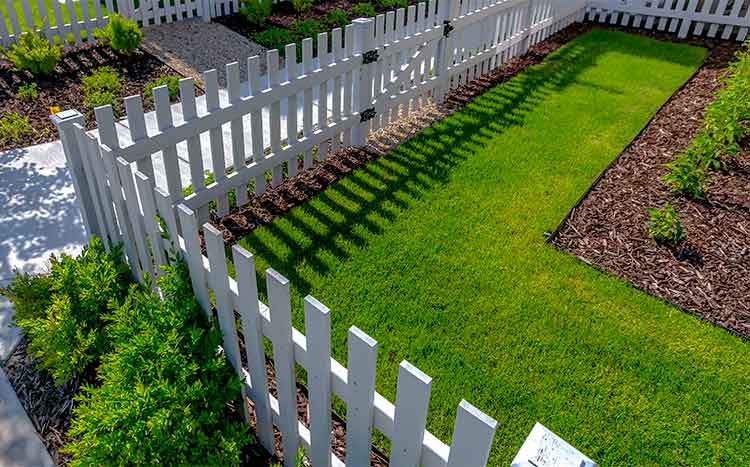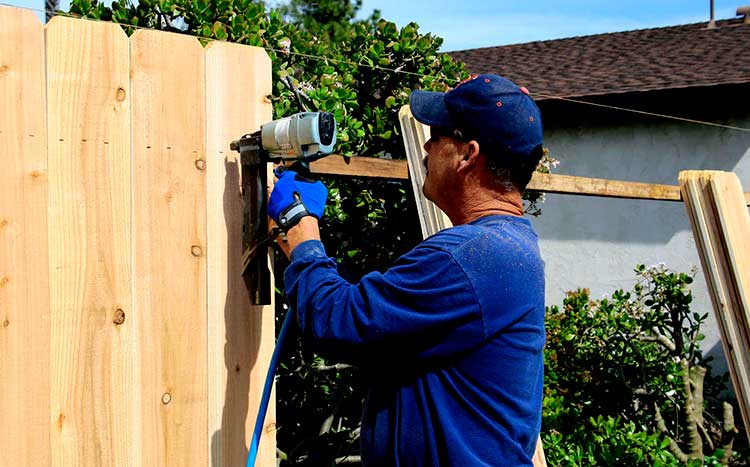In a perfect world, neighbors would live together harmoniously without any disputes or continued disagreements. However, when several neighbors decide to put up fences to mark boundaries and improve privacy, it’s probable that disagreements will emerge.
Whenever you find yourself in such a situation, the Tennessee property line and fence laws should be your best friend. Here’s a guide to resolving some of the most common sources of contention.

What we cover
ToggleDo I need a permit to build a fence in Tennessee?
Fence regulations vary in each county or city in Tennessee. For most regulations, including the city of Nashville, Chattanooga, and Memphis, a permit isn’t required for fences under 7 feet.
However, in other cities such as Gallatin, Bartlett, and Murfreesboro, you’ll need a permit to begin any residential fence installation.
Other towns may also have different requirements. Therefore, it’s best that you talk to your local building department before starting your project.
Can I replace an existing fence without a permit?
Ideally no. While the fence permit laws differ in each county and town, most authorities demand a permit for any replacement that alters the structure of the existing fence.
This means that if the replacement will change the location, height, or materials of that fence, a permit is needed. You might even need a permit to repair up to 50% of the existing fence.
Tip: If you’re unsure of the permitting rules in your area, consult or hire a local fencing company. They usually keep up with the changes in the town’s fencing ordinances.
How tall can a privacy fence be in Tennessee?
Fence height restrictions for every neighborhood are usually listed in the city or county zoning ordinances. According to most restrictions, fences in residential districts are limited to a maximum height of 6 feet.
The front yard fencing is restricted to a maximum of 4 feet and a 6 feet maximum for fences on the side or rear yard.
In some cities like Nashville, the height restrictions are slightly different, with open front yard fences having a height limit of 6 feet and rear fences 8 feet.
If you wish to exceed these heights, you can apply for a review from the design review commission to justify your need for the extra height.
Who owns the fence on property lines in TN?
The fence on the property line between adjoining neighbors in Tennessee belongs to both of them. According to the Tennessee fence laws § 44-8-202, both property owners are equally responsible for the partition fence maintenance and repair.
In fact, one neighbor may be compelled to contribute towards the fence even if they don’t use or benefit from it. The only exceptions come in if the neighbor appeals the ownership of the fence on the grounds of not having agricultural land.
How do you know where the property boundary is?
Your property’s boundary is usually indicated on the deed of your property. This includes any agreements that previous owners could have made.
If your property lies on platted land, you can also visit your local county assessor’s office to access the public map of your neighborhood. Be sure to confirm whether the county has provided online access to these maps.
For cases where you can’t agree with your neighbor on the location of the boundaries based on the above data, you can also hire a surveyor.
Professional land surveyors will account for all historical boundary agreements and legal details on the deed to determine the boundary.
Can my neighbor build a fence on the property line?
Yes! The Tennessee laws allow the neighbor to build their fence right up to the property line. Being a fenced-in state, they can do this to keep their animals from damaging your property.
However, if you join the fence or use it in any way as a partition fence, the law may demand you to compensate that neighbor an equal proportion of their expenses.
You’ll also be required under T.C.A. § 44-8-203 to maintain your part of that fence in good condition. Otherwise, you’ll be held responsible for any damages you sustain if trespassing animals destroy your property.
If any disagreements arise from this fence, you can call on three freeholders who’ll assess and determine the case then report in writing to a judge how much each party should contribute.

Can I put up a fence on my side of the property line?
Yes. Property owners in Tennessee are encouraged to build fences to protect their farms and livestock. However, for any fences built within your side of the property line, the adjoining neighbor can’t be forced to contribute towards its maintenance.
You’ll have to bear the costs of installation and repairs. The law also demands that you maintain that fence in good repair at all times.
For the design, height, and setback restrictions, you have to adhere to the ordinances set by your township and Homeowner’s Association.
Tennessee Fence law basics
Under part 2 of the T.C.A. § 44-8-201, the Tennessee fence laws define partition fences as; “fences erected on the line between lands owned by different persons.”
As such, it implies that the fence is the responsibility of both landowners, even if one of them doesn’t necessarily want it. Each adjoining owner is required to share the costs of that fence construction and repairs equally.
The ownership rule also applies to fence removal where T.C.A § 44-8-208 prohibits any owner from removing the fence unless through mutual consent.
Alternatively, the law demands a neighbor desiring to remove a fence to give a 6-month notice in writing before taking action.
Nonetheless, one property owner is free to submit a written document to disclaim responsibility for constructing or maintaining a partition fence. Such a disclaimer applies if you don’t have agricultural land, but the neighbor does.
Out-of-court dispute resolution procedure
Among the best things about the Tennessee fence laws is that it has clearly outlined their procedure of handling disputes.
If adjoining properties owners can’t agree, here are the steps to follow:
- The aggrieved party applies to a judge of the court of general sessions to appoint three freeholders.
- The freeholders will send a notice to both parties, after which they’ll visit the fence, assess the problem then report to the judge (in writing) the totals to be paid by each owner.
- Each party is expected to pay within 10 days, although the judgment can be appealed.
What is a spite fence?
A spite fence is defined as any fencing structure that’s built with the intention to injure or annoy the adjoining neighbor. While the Tennessee statutes don’t directly cover spite fences, property owners can take such a matter to court.
Based on previous rulings, such as the case of BRENDA DUNCAN ALBRIGHT, v. RANDOLPH & SHERRY TALLENT, the courts consider any fence built for no useful purpose illegal.
Therefore, property owners can take owners of spite fences to court to have the fences abated and recover damages.
Tennessee boundary fence laws at a glance
This table provides an overview of some of the state laws governing Tennessee’s fence laws and links to their original documents.
| Statues | Disputed Boundaries | Local Fence Regulations |
|---|---|---|
| Tennessee Code § 44-8-201 Partition fence defined Tennessee Code § 44-8-202 Fences to be built and maintained at the joint expense Tennessee Code § 44-8-203 Damages for failure to maintain the fence | When a court determines a disputed boundary, it must examine the following factors in order of priority: Natural objects or landmarks Artificial monuments or marks Boundary lines of adjacent landowners Courses and distances | City of Nashville Fence ordinance City of Chattanooga Building codes City of Memphis Fence regulations |
Keep in mind; These laws are bound to change with time depending on the new legislation, federal court decisions, and other initiatives. Use the information provided above as a guide and research the latest regulations in your municipality.
FAQ's
Who owns the fence between neighbors?
Both neighbors are recognized as the joint owners of a partition fence. They are equally required to share the costs of the fence, from construction to maintenance.
What if a new fence is blocking my view?
Any fences constructed purely to annoy or interfere with the enjoyment of your property can be considered a spite fence. You can file a suit in a Tennessee court to have an injunction issued against it.
Can my neighbor hang things on my fence?
No. The fence laws prohibit neighbors from using your fence in any way. If they hang things on it, you have the right to involve a legal expert to guide you on the best way to resolve the issue.
Can I paint my side of the fence?
It depends on your fence agreement. In most cases, you can’t paint your side of the fence if you don’t own the fence. Additionally, even if you have permission from your neighbor, your local HOA may have restrictions governing which colors or designs you can use.
Can I build a fence next to my neighbor’s fence?
Yes. Tennessee fence laws allow you to build a fence on your side of the property line without violating any rules. You should, however, be keen to ensure you don’t encroach on your neighbor’s side.
Can my Neighbour remove the fence between our properties?
Not really. The law only allows the neighbor to remove the fence if you have both agreed to it. Otherwise, he/she will have to give you a 6-month notice before removing the fence.
Which fence is mine in the back garden?
There are no set regulations regarding which side of the fence you own in the back garden. This is usually an agreement between you and the neighbor. In special cases, this information may be indicated on your deed if there’s already an existing agreement for the property.












